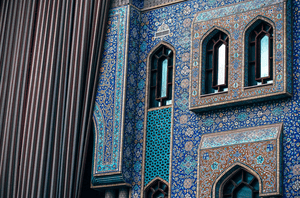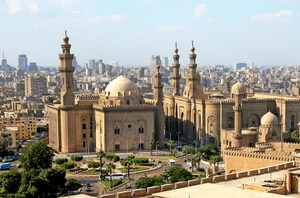Ramaḍān is a manifestation of Allah’s love for us. From His love, He opens the doors of Paradise in this sacred month and closes the doors of Hell-fire. From His love, He blesses us with the gift of fasting and the night prayer. From His love, He overlooks our transgressions in the year and offers abundant opportunities of forgiveness in this month. From His love, in this month, He gives us the most blessed night of the year: Laylat al-Qadr.
Ramaḍān is the best time to attain the love of Allah, as we increase in conversing with Allah and reciting His words. We have multiple opportunities in this month to experience the joy of His love, and delight in being close to Him. It is a month in which we try to tame our nafs, and become humble in our interactions with our fellow believers — one of the foremost qualities of those whom Allah loves.
Ramaḍān is the best time to attain the love of Allah, because we reduce our love for those things which compete with His love. We love food, but we give it up when we fast because our love for Allah is greater. We love sleep, but we give it up when we stand for the night prayer because our love for Allah is greater. We love to socialise and be entertained, but we give it up when we perform iʿtikāf because our love for Allah is greater.
Love: The Key to Success
Love is the greatest station the seeker on the journey to Allah (subḥānahū wa taʿālā) can attain. The love of Allah is the purest and greatest of all loves. It gives life to the heart, it is sustenance for the soul, and is the roadway to eternal success.
Love is the road to Paradise. It is the main reason why we worship Allah, and it is the only way to live a true meaningful life on earth.
Without the love of Allah, life is bleak. This is because there is a void in every person’s heart which can only be filled with the love of Allah. Without love, a person’s life will be full of sadness, anxiety, pains and regrets. On the other hand, when the heart overflows with His love, a person will experience bliss and contentment.
“Undoubtedly, the greatest pleasure of this world is the pleasure of knowing and loving Allah. This is the highest level of bliss one can experience in this world. In contrast, other temporary pleasures of this life are like a drop in the ocean — for indeed, the soul, heart and body were created (to know and love Allah). The most joyous aspect of the world is to know and love Allah, and the greatest pleasure in Paradise will be to see Allah.” – Ibn al-Qayyim (raḥimahullāh)
Love is the essence of ʿubūdiyyah (servitude) and the secret of lā ilāha illā-Allāh. Loving Allah is the basis of our īmān. Allah says, “Still there are some who take others as Allah’s equal—they love them as they should love Allah—but the believers love Allah even more” (2:165).
There is a vast difference between someone who obeys Allah out of love for Him, and someone who obeys Him without love. When a lover obeys his beloved, the obedience is done willingly and sincerely. Without love, however, a servant obeys out of a weary compulsion. The former experiences happiness and joy in willingly complying to the orders, whereas the latter feels burdened, and even resentful. Love, therefore, is the driving force and the impetus of ʿibādah.
How Can You Not Love Him?
As humans, we adore perfection, and Allah is the epitome of perfection. Similarly, we love beauty and our hearts are naturally inclined to it. Allah is al-Jamīl, The Most Beautiful. Although we cannot comprehend the beauty of Allah, it is enough to know that every beautiful thing we see on this earth is from Him.
Likewise, our hearts have been created with a natural disposition to love those who do good to us. How can we not love Allah when every single blessing and good that we have is from Him? There is no one kinder, more appreciative and more generous than Him: He is al-Wahhāb, The Ever-Giving.
Allah is al-Wadūd, The Most Loving. Anyone we love – from the creation – loves us for their sake. Allah, on the other hand, loves us for our own benefit. People interact with us because they hope to attain something from this relationship. Allah however calls us to love Him so that we can benefit. Not only does He benefit us, but He gives us compound benefit: the reward of a good deed is multiplied from 10-700 times, whereas a sin is recorded as one single bad deed; and even that can be swiftly erased. Allah does not need us, yet He feeds us, honours us, and guides us.
Allah is al-Ghaffār, The Most Forgiving. He loves to forgive and will forgive us even if we go to Him with mountains of sins. He is al-Sittīr, the Concealer of sins. He does not expose us, nor humiliate us. Instead, He offers us endless opportunities to repent, and is delighted when we turn to Him in repentance.
Allah is al-Qarīb, The Ever-Near, and al-Ḥayiyy, The Shy, who feels shy to reject our duʿās. Whilst our fellow humans tire of our persistent questioning and begging, Allah, our Generous Lord, does not stop giving and is angered when we don’t ask from Him! In fact, He gives us even before we ask Him.
Do We Truly Love Allah?
How do we know if we truly love Allah? Are our claims of loving him genuine? Allah says,
قُلْ اِنْ كُنْتُمْ تُحِبُّوْنَ اللّٰهَ فَاتَّبِعُوْنِىْ يُحْبِبْكُمُ اللّٰهُ وَيَغْفِرْ لَكُمْ ذُنُوبَكُمْ ، وَاللّٰهُ غَفُوْرٌ رَّحِيْمٌ
“Say: If you (sincerely) love Allah, then follow me; Allah will love you and forgive your sins. For Allah is All-Forgiving, Most Merciful” (3:31).
Thus, the litmus test of loving Allah is whether one follows and obeys the Messenger ﷺ.
“Whosoever claims to love Allah – Mighty and Majestic is He – but doesn’t comply with Allah’s commands, his claim is false. For every lover that does not fear Allah, is deluded.” – Abū Yaʿqūb al-Nahrujūrī (raḥimahullāh)
Loving Allah (ʿazza wa jall) can only be achieved when you prefer Him over everything else. You must love Him more than you love your parents, children, spouse, friends and wealth.
Attaining the love of Allah is a journey. It may be that at the beginning, you are unable to fully love what Allah loves as your heart is imprisoned by your desires. However, as your love for Allah increases through worship, you liberate yourself from your own desires. The love of anyone other than Allah slowly fizzles away, and Allah’s preferences become your own preferences.
The pursuit of Allah’s love requires effort and persistence. There will be times when you will relapse, but the main thing is to not give up. Keep trying no matter how many times you fall down. It will definitely be worth it.
Becoming Allah’s Beloved
Loving Allah is extremely special. But imagine being loved by Allah! Imagine being from the “People He loves and who love Him” (5:54).
This Ramaḍān, make it your goal that in addition to the farḍ acts, you will worship Allah with the nafl acts so that you become from those He loves.
Allah (ʿazza wa jall) says in a ḥadīth qudsī: “My servant does not draw closer to Me with anything more beloved to Me than that which I have made obligatory upon him. My servant continues to draw closer to Me with voluntary acts until I love him. When I love him, I am his hearing with which he hears, his sight with which he sees, his hand with which he grasps and his foot with which he walks. If he asks Me, I will certainly give him, and if he seeks My protection, I will certainly give him My protection. And I do not hesitate about anything as much as I hesitate about (seizing) the soul of My faithful servant: he hates death and I hate hurting him” (Bukhārī).
We learn from this ḥadīth that when the love of Allah saturates the heart, the lovers’ sole concern becomes Allah. Every encounter reminds them of Allah. Everything they now do, hear, see, and say is only for Allah, and in accordance with what pleases Allah. They move from the level of īmān to iḥsān: they now worship Allah as though they can see Him.
Similarly, Allah now gives them everything they ask for. Allah does not say no to them, as they do not say no to Him. He protects them, as they protect their senses and protect the dīn of Allah.
We ask Allah al-Wadūd (The Most Loving) with the words of His beloved ﷺ:
اَللّٰهُمَّ إِنِّيْ – أَسْألُكَ حُبَّكَ وَحُبَّ مَنْ يُحِبُّكَ، وَحُبَّ عَمَلٍ يُقِرِّبُ إِلَى حُبِّكَ
O Allah, I ask You for Your love, the love of those whom You love, and the love of deeds which will bring me closer to Your love. (Tirmidhī)






